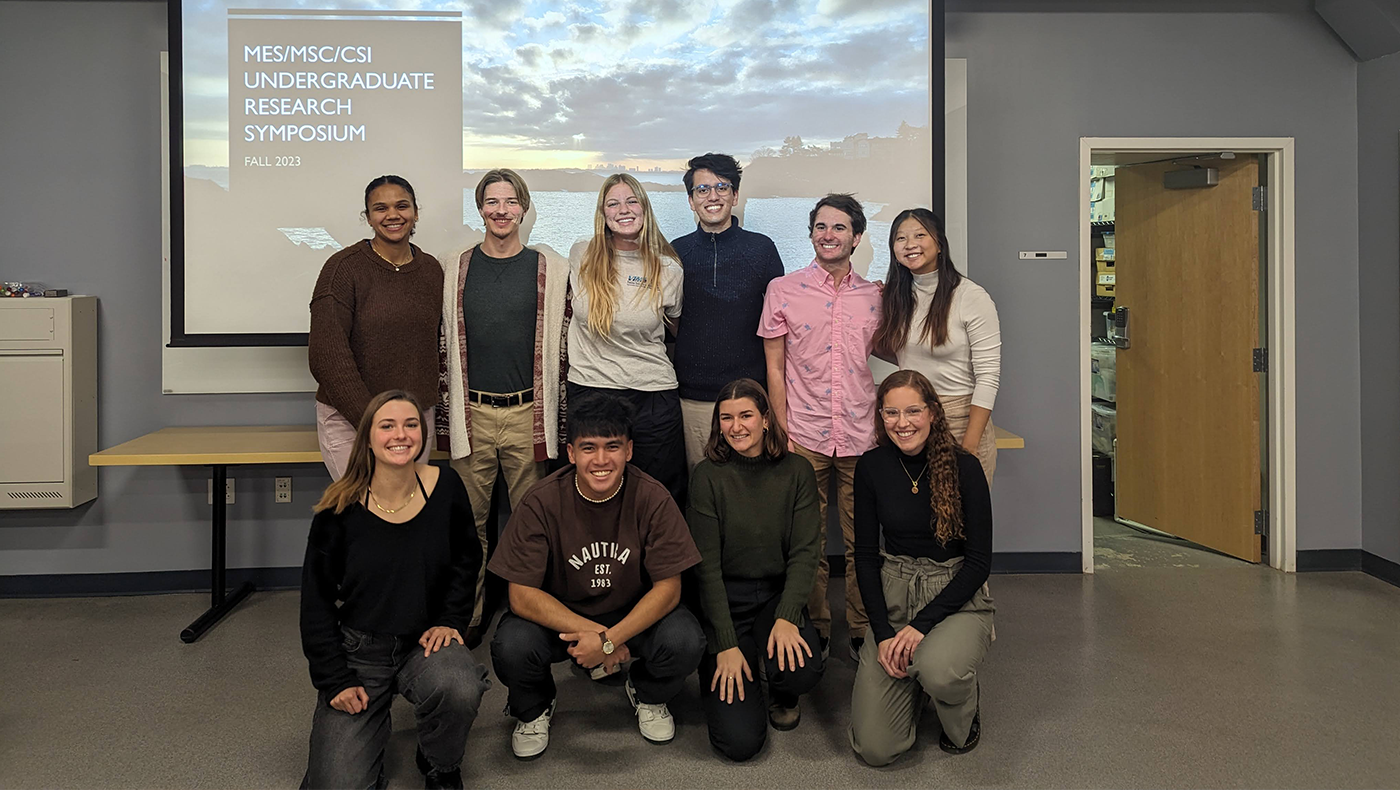Our undergraduate scholars presented their findings while engaging in Q&A dialogue with the audience. Each student provided in-depth analysis of data obtained throughout the course of their research at Northeastern University.
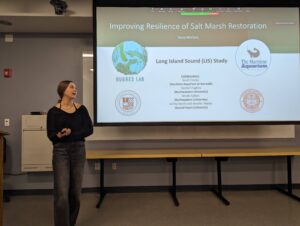
Tessa McClain | Hughes Lab
Improving Resilience of Restored Salt Marshes.
During her co-op in the Hughes Lab, Tessa McClain investigated the resilience of Spartina alterniflora to climate change. Her work combined in situ field studies and greenhouse experiments to better understand how flowering in northern-sourced and southern-sourced Spartina alterniflora responds to warming temperatures. McClain shows that warming decreases flower production in both natural and restored marshes, but that using southern-sourced plants in northern salt marsh restoration efforts may mitigate some of the effect of warming on flowering.
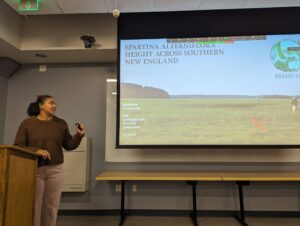
Madeleine Duchaussee | Hughes Lab
Spartina alterniflora Growth in Salt Marshes Across New England.
During her co-op in the Hughes Lab, Madeleine Duchaussee examined patterns of Spartina alterniflora height across salt marsh platforms, contributing valuable insights to the understanding of coastal ecosystems. Her work showed a strong inverse relationship between plant height and distance from the water in a study of 40 New England salt marshes, the first study of its kind to show such a clear pattern across many populations.
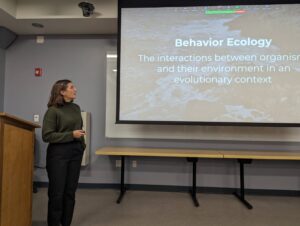
Claudia Decker | Kimbro Lab
The Influence of Global Change on the Foraging Behavior of a Key Herbivore in New England Subtidal Kelp Systems.
Claudia Decker’s co-op in the Kimbro Lab explored how global oceanic change can alter predator behavior using the green sea urchin (Strongylocentrotus droebachiensis) as a model organism. Decker’s work used mesocosms to demonstrate that introducing an invasive algae species can significantly diversify individual diet preferences within a population. Her work exemplifies the Kimbro Lab’s commitment to understanding complex trophic relationships within rapidly changing marine environments.
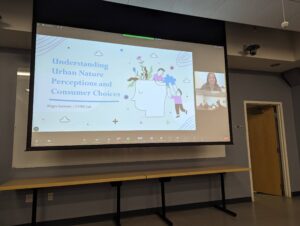
Alegra Germain | CORE Lab
Understanding Urban Nature Perceptions and Consumer Choices.
During her co-op at Northeastern’s CORE lab, Alegra Germain investigated the relation between sustainable consumer choices and the perception of urban greenspace. Through a series of survey studies, Alegra revealed that increasing positive perceptions of urban nature may indirectly increase eco-friendly consumer choices. Her work contributes to a deeper understanding of the intersection between nature, consumer behavior, and urban environments –– offering valuable insights for sustainable urban planning.
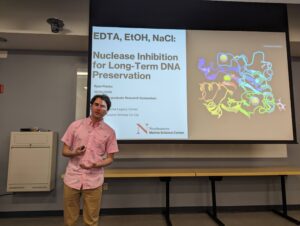
Ryan Pianka | Ocean Genome Legacy
EDTA, EtOH, NaCl: Nuclease Inhibition for Long-Term DNA Preservation.
During Ryan Pianka’s co-op at the Ocean Genome Legacy Center (OGL), he conducted research within the MSC’s expansive DNA biorepository. Specifically, he explored the synergistic effects of EDTA, ethanol (EtOH), and sodium chloride (NaCl) as potential inhibitors for nuclease activity, paving the way for advancements in long-term DNA preservation. His work showcases a commitment to refining techniques crucial for preserving genetic material and holds promising implications for various fields, including genomics and forensic science.
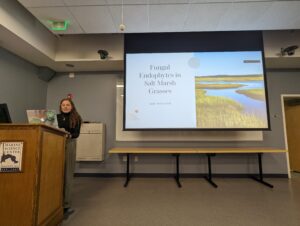
Abigail Moulton | Hughes Lab
Fungal Endophytes in Salt Marsh Grasses.
Abigail Moulton’s senior thesis at Northeastern University explores the symbiotic relationships between fungal endophytes and salt marsh grasses, offering valuable insights into the ecological dynamics of coastal environments. She has successfully characterized 60 morphotypes of fungal endophytes in local populations of Spartina alterniflora and plans to sequence the genomes of each one. Her work signifies a crucial step towards understanding the role of fungal symbiosis in enhancing the resilience of salt marsh ecosystems.
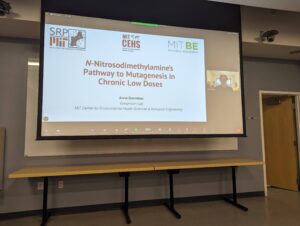
Anna Dormitzer | Essigmann Lab (MIT)
N-Nitrosodimethylamine’s Pathway to Mutagenesis in Chronic Low Doses.
During her co-op at MIT’s Essigmann lab, Anna Dormitzer investigated the biochemical pathways leading to mutagenesis in chronic low doses of N-Nitrosodimethylamine (NDMA). Her work delved into the mechanisms underlying NDMA’s mutagenic effects in mouse models, contributing essential knowledge to our understanding of chemical exposures and genetic instability. Her work underscores the importance of exploring the long-term impacts of industrial pollutants and has implications for future assessments of the health risks associated with chronic NDMA exposure.
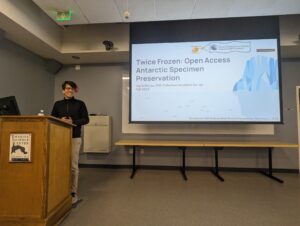
Jay Krithivas | Ocean Genome Legacy
Twice Frozen Over: Open-Access Antarctic Specimen Preservation.
Jay Krithivas’s co-op at OGL focused on the public archival of a research collection consisting of over 1000 Antarctic specimens. During this process, he explored methods for cataloging biological data in an open-access framework, addressing the challenges associated with remote and extreme environments. His work not only expands the biodiversity of OGL’s collection but also emphasizes the importance of accessibility to fostering collaborative research efforts in marine exploration.
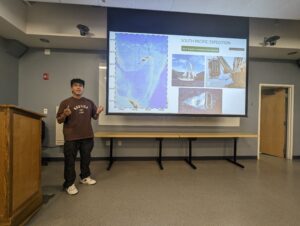
Mark Teh | Sea Education Association
Photophysiological response of Cyanobacterium synechococcus to ocean acidification in the hyperoligotrophic South Pacific.
Mark Teh’s research with the Sea Education Association (SEA) explored the physiological response of cyanobacteria (blue-green algae) to ocean acidification in the South Pacific. His work indicated that acidification restricts this key microorganism’s ability to acclimate to changes in light intensity. Through this project, he emphasized the need for further investigation into the effects global change factors have on marine primary producers.
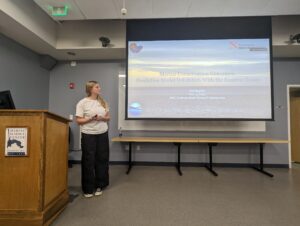
Zea Segnitz | Lotterhos Lab
Marine Conservation Genomics with the Eastern Oyster in the Lotterhos Lab.
Zea Segnitz’s co-op at the Lotterhos Lab delved into the realm of conservation genomics, focusing on Eastern Oyster adaption to changing oceans. Zea’s work contributed to an ongoing common garden experiment measuring oyster fitness along the Eastern Seaboard. In this project, she determined the average survival rates and sizes of oysters across various genetically distinct populations, further enhancing our understanding of this key ecosystem engineer.
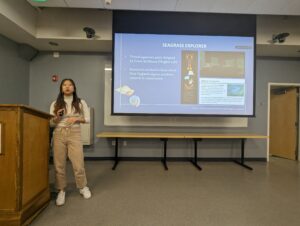
Victoria Mung | MSC Outreach Department
Research and Environmental Education through Outreach Programming.
Victoria Mung’s co-op for the Marine Science Center’s Outreach Department focused on the intersection of research and environmental education through outreach programming. Through her work, Victoria engaged in community initiatives that bridged scientific inquiry with community education, fostering a deeper understanding of environmental issues. Her commitment exemplifies the importance of merging research endeavors with impactful outreach, contributing to a more informed and environmentally conscious society.
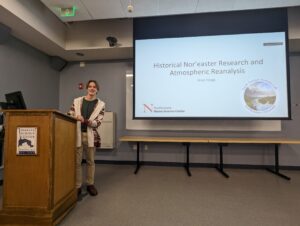
Jesse Hoogs | Muñoz Lab
Historical Nor’easter Research and Atmospheric Reanalysis.
Jesse Hoogs’ co-op at the Muñoz Lab explored historical atmospheric data and sediment cores to characterize the long-term effects of storm flooding. Specifically, Jesse focused on the atmospheric dynamics of Nor’easter events, contributing valuable insights to our understanding of these impactful weather phenomena. His work not only enriches the historical meteorological record but also advances our ability to model and predict the behavior of Nor’easters in the context of climate variability.
